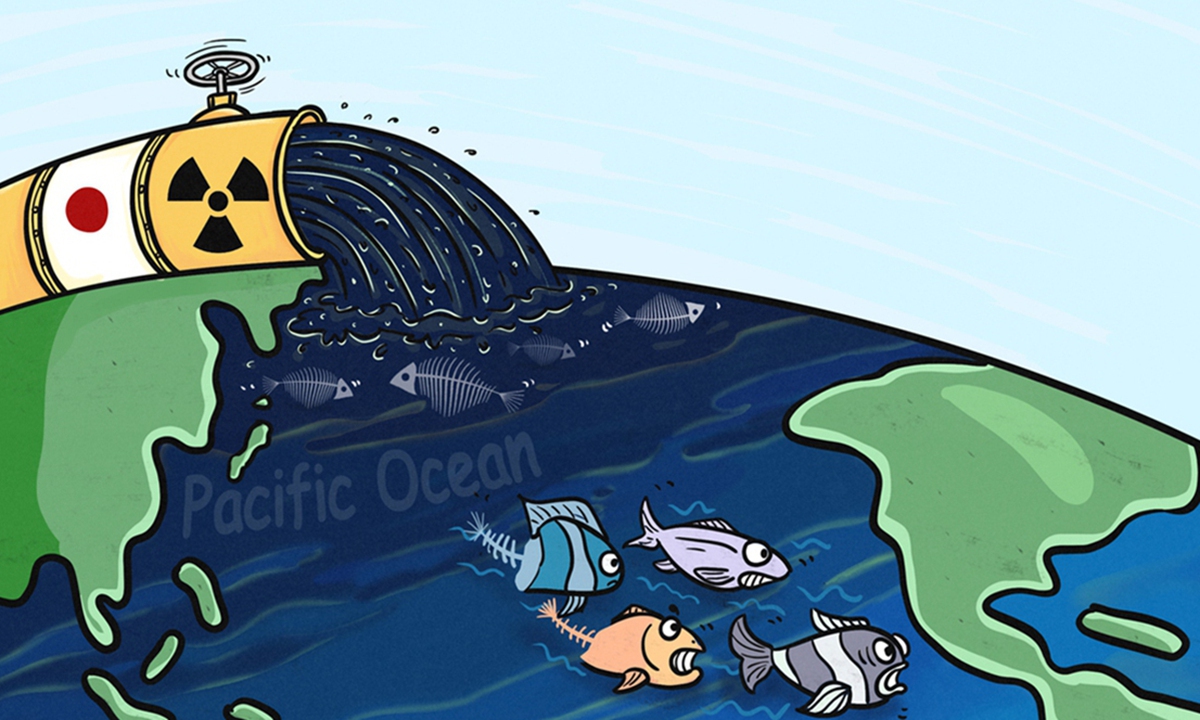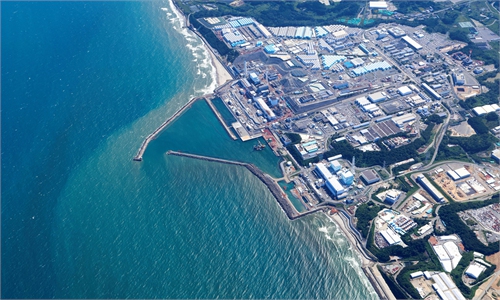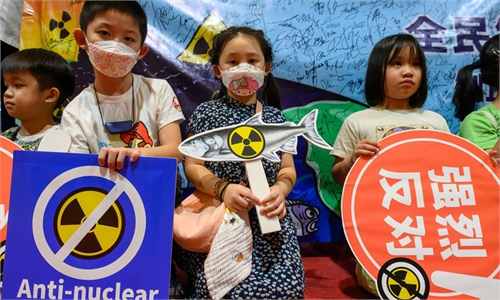
Illustration: Chen Xia/GT
With Fukushima nuclear-contaminated water continuing to flow into the Pacific Ocean, international criticism has rained down on the Japanese government for its irresponsible, illegal and immoral action. However, instead of correcting its wrongdoing, Japan has resorted to counter-accusations against China by portraying itself as a victim so as to divert the focus from its dumping of nuclear-contaminated water to tensions between China and Japan.Japanese Foreign Minister Yoshimasa Hayashi told reporters on Tuesday that Japan would take "necessary action (on China's aquatic product ban) under various routes including the WTO framework." On the same day, Japan's Economic Security Minister Sanae Takaichi said that filing a WTO complaint might become an option if protesting to China through diplomatic routes was ineffective.
The comments came in response to Beijing's ban on all of its seafood imports from Japan, but the Japanese side has avoided mentioning that the root cause of the situation is its release of the Fukushima nuclear-contaminated water into the sea.
Given the situation, China needs to consider making good use of international judicial procedures as an option to seek a reversal of Japan's dumping plan.
This is not a political issue, but an issue concerning people's health and the global marine environment. Japan must not be allowed to use political or economic tensions to divert attention from its discharge of nuclear-contaminated water.
There are dozens of radioactive isotopes in Japan's nuclear-contaminated water, but Tokyo Electric Power Co (TEPCO) only claimed to have diluted the water until the tritium levels fell below regulatory limits before pumping it into the sea.
It's hard to verify whether Japan's Advanced Liquid Processing System can remove all the other radioactive isotopes.
Given these circumstances, China's ban is a clear manifestation of its concerns over the potential impact of the nuclear-contaminated water on its food safety and its people's health. Japan's threat to take China to the WTO won't deter China.
Since China cannot conduct an independent and scientific verification as to whether Japan's "treated" nuclear-contaminated water is safe or not, it now falls to Japan to find a way to prove to its major seafood buyers that it is safe, if it really wants to overturn China's decision. Otherwise, even without the ban, average consumers would still avoid buying food with a high risk of nuclear contamination, especially Japanese aquatic products that come from waters with the highest concentration of radioactive pollutants.
China is not the only one among neighboring countries worrying about the potential impact of Japan's release of nuclear-contaminated water. South Korea has retained the ban on imports of aquatic products from Fukushima prefecture and the surrounding areas, and Japanese seafood is prohibited in primary and secondary school cafeterias in the country.
It is inevitable for Japan to pay the price for its irresponsible and selfish act that ignores the international public interest, and the fear over its aquatic products may only be the beginning. If Japan's dumping of nuclear-contaminated water does cause severe consequences to the oceans and has a heavy impact on global fisheries and other industries, countries and businesses should unite to demand compensation from Japan.
China, which is likely to be the biggest victim, or at least one of the biggest victims, needs to strengthen the monitoring of radioactive elements in our offshore waters in order to ensure food safety, and it also needs to take the initiative to fight the move through international organizations, such as the International Court of Justice or the International Tribunal for the Law of the Sea to stop Japan's dumping.
While the Japanese government passed a State Secret Law that classified any information about Japan's nuclear issues, including the Fukushima nuclear accident, as "national security" or "special secrets," China and other interested countries still have the right to demand that the Japanese government, TEPCO and those responsible bear their responsibilities and stop their violations of international laws and conventions.
Japan is a contracting party to the United Nations Convention on the Law of the Sea, which stipulates that states shall take all measures necessary to ensure that pollution arising from incidents or activities under their jurisdiction or control does not spread beyond the areas where they exercise sovereign rights in accordance with the Convention.
However, due to such factors as currents, magnitude and migratory fish, the dumping of Japan's Fukushima water into the sea will inevitably have a cross-border impact. That means the illegality of Japan's dumping is indisputable.



